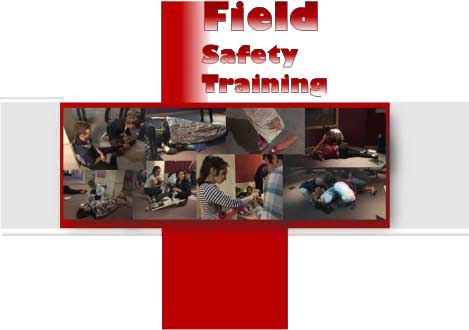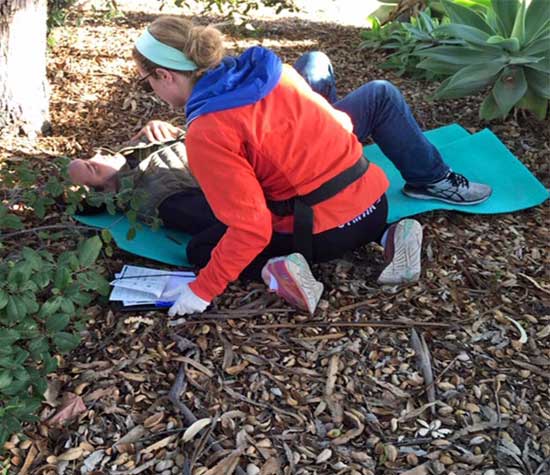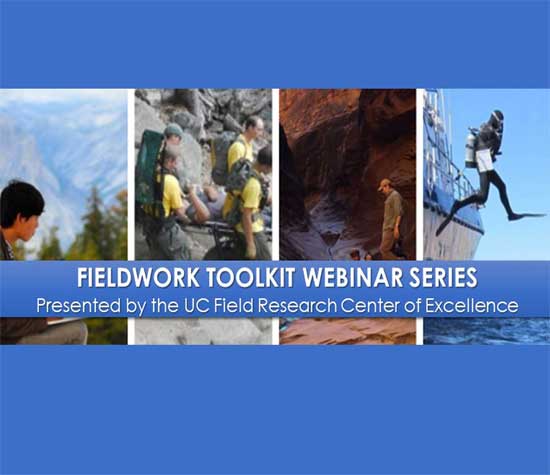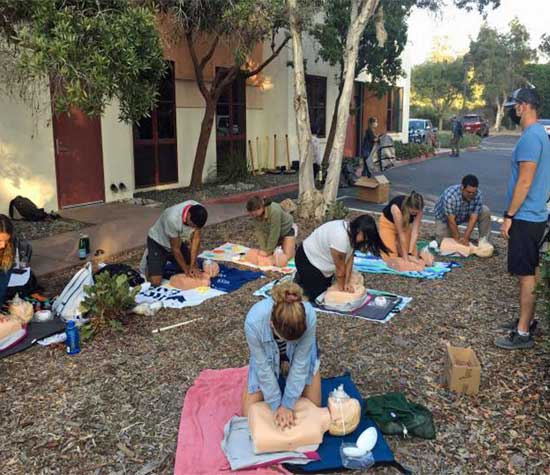Jump Links to Topics Below
Field First Aid
Wilderness First Aid
Wildfire Smoke Protection Training
Additional Training
Field First Aid

Field First Aid
Friday, April 10, 2026, 1:30pm-8:30pm
- LOCATION: EHS Patio and Training Room
-
Signup Due Date: Friday, March 27, 2026
-
General Schedule
-
Field Planning and Fire Suppression 1:30-3:00
-
Field First Aid Training and Skill Activities 3:00-6:00
-
Adult/Child/Infant CPR and AED Training 6:30-8:30pm
-
Summary of First Aid Skills Covered
- Duty of Care
- Scene Safety
- Initial Assessment
- Lifting and Moving
- Basic Neurological Assessment
- Foreign Body Airway Obstruction
- Controlling Bleeding
- Strains, Sprains & Fractures
- Bites and Stings
- Shock Management
- General Medical Emergencies
- Wound Infection
- Asthma
- Heart Attack
- Diabetic Emergencies
- Burns
- Seizures
- Poisoning
- Temperature Related Injuries
- Infant, Child and Adult CPR and AED Training
- Use of Epinephrine and Naloxone Auto-Injectors
Optional First Aid Card available for $25.
Wilderness First Aid

The UCSB Rec Cen hosts 16 hour Wilderness First Aid Courses on campus.
Please provide in your request your name as it should appear on the certificate of completion, your email address and your phone number.
This information will be provided to the Rec Cen to save a spot in the course and for course-related information.
https://recreation.ucsb.edu/adventure-programs/wilderness-medicine
EHS Field Research Safety will pay 70% of the course cost.*
*The fine print: Funds for WFA training are available to those who are affiliated with UC Santa Barbara. Use your ucsb.edu email when asking about the availability of funds.
Other UC affiliates are welcome to attend a UC Santa Barbara-coordinated WFA course; contact your campus' Field Safety Officer about using your campus' loss prevention funds.
Volunteers must be registered and covered by UC Santa Barbara Workers Compensation to qualify.
Contact field@ehs.ucsb.edu for a grant to attend a Wilderness First Aid course.
The remaining 30% of the course cost is paid by a departmental recharge number or a personal check made out to the "UC Regents" and sent to Jamie Bishop, EHS Field Research Safety, 565 Henry T. Yang Drive, Santa Barbara, CA 93106-5132.
Wildfire Smoke Protection Training

In an effort to protect outdoor workers from hazards associated with wildfire smoke, the Cal/OSHA Standards Board recently approved an emergency regulation establishing new protection requirements(Cal/OSHA Title 8 Section 5141.1.)
The standard is applicable when the Air Quality Index for fine particulate matter (PM2.5) is 151 or greater. It applies to employees who work outside or in non-filtered buildings and/or vehicles for more than one hour per shift. Use the Decision - Making Matrix below to help guide in the event of a wildfire.
The University of California has measures in place to inform you of, and protect you from, the dangers of inhaling wildfire smoke. To complete Wildfire Smoke Training:
1. Review the information provided in the handout.
2. Take the test to receive credit.
For more information and resources on protection from wildfire visit the EH&S - Industrial Hygiene webpage.
Additional Training

Training to Promote Safe and Inclusive Fieldwork
- UC Fieldwork Toolkit Leadership Training Series, including topics of preventing harassment in the field, creating safe learning environments, and promoting safe fieldwork culture for diverse researchers
- New in 2025! The ADVANCEing FieldSafety course provides team leaders and participants with the skills and tools to build a welcoming and inclusive field culture. This course will help you and your team develop norms and codes of conduct, and review or clarify leadership and field team organization. Additionally, you and your team will learn how to identify unsafe and harmful behaviors, respond appropriately to dissipate and mitigate these behaviors, and support those impacted by the behaviors. Finally, the course will provide tools to create, build and support inclusive mentorship, consider additional factors for mitigating risk to diverse individuals in the field, and how to build cultural inclusivity within your team. ADVANCEing FieldSafety provides tools to address a growing awareness of the challenges of working (far) away from support networks and resources traditionally found at home. ADVANCEing FieldSafety is designed for every member of research teams operating in field environments, from seasoned academics, technical support staff to undergraduates.
9-hour, 3 module course on Coursera
